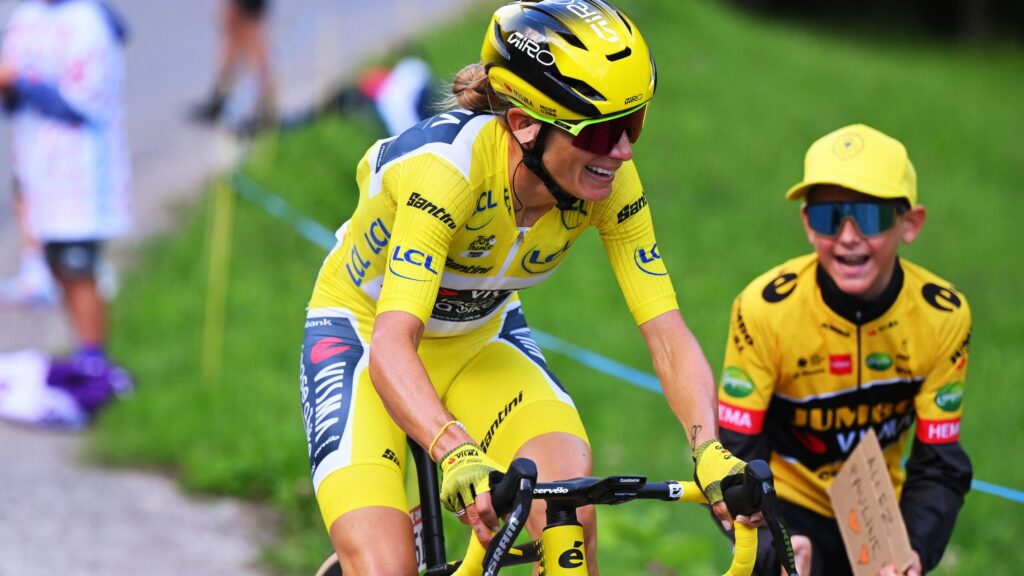French cyclist Pauline Ferrand-Prevot won road cycling’s biggest event after years of racing—and winning—in cycling’s other disciplines
Pauline Ferrand-Prevot celebrates her Tour de France win (Photo: Tim de Waele/Getty Images)
Updated August 4, 2025 03:46PM
She soars up the steepest roads in the Alps and descends treacherous mountain biking trails with skill and grace. She can pedal over jarring cobblestones, through deep mud, and across slick tarmac. She is, hands down, the most versatile cyclist on the planet, and the newest champion of the sport’s biggest race, the Tour de France.
On Sunday, August 3, French cyclist Pauline Ferrand-Prevot—we cycling fans just call her PFP—won the Tour de France Femmes. The victory solidified her spot at the top of women’s professional road cycling, and stamped her place in history as one of the most accomplished cyclists—man or woman—to ever race a bicycle.
Hardcore cycling fans like myself have followed PFP’s exploits over the past decade. And while the Tour de France Femmes victory is the biggest win of her career—she was on the cover of The Wall Street Journal on August 4—it’s hardly the first eye-popping win she’s had.
So, for those of you who aren’t students of pro cycling, here are five things to know about the newest winner of the Maillot Jaune.
1. She’s an Outlier in Cycling’s Era of Versatility
Some quick background: As youngsters, most budding pro cyclists compete in bike racing’s four primary disciplines: road, cross-country mountain bike, cyclocross, and track cycling. At some point in their development, the very best choose just one to master. In past generations, for example, you rarely saw Tour de France heroes also compete in mountain biking World Cups or velodrome events in the same season.
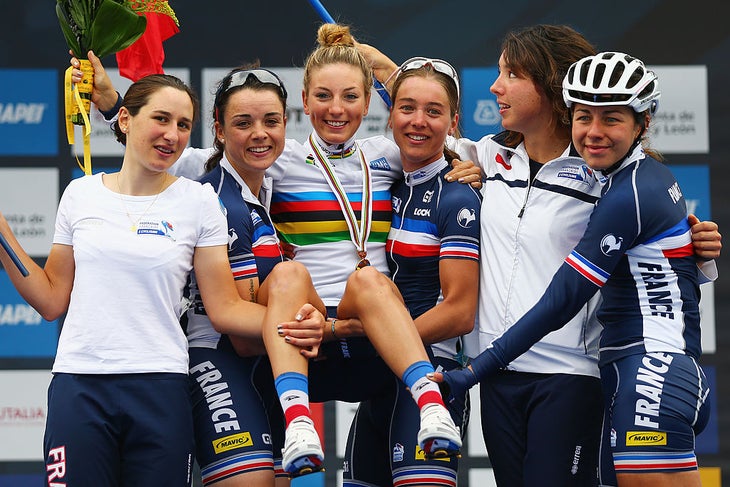
Sport specialization shifted a decade or so ago, with hyper-versatile riders like Mathieu van der Poel, Wout van Aert, and Tom Pidcock entering the peloton. But even amongst this peer group, PFP stands out.
In 2014 and 2015, when she was just 23 years old, PFP won the elite world championships for road cycling, mountain biking, and cyclocross in a 12-month span.
I cannot stress the bonkers nature of this achievement—it was a first for pro cycling.
All three racing formats are of dramatically individual durations, involve different bicycles, and require different strategic acumen and physical gifts. And in each one, PFP beat hyper-talented professional racers who focus on that one discipline. She showed she could sprint, climb, descend, attack, and ride people off of her wheel on flat roads.
No, it isn’t just like Michael Phelps winning the backstroke, freestyle, and breast stroke. It’s more like if Tiger Woods used his talents for swinging a stick to belt home runs, win Wimbledon, and take the Masters.
From that year onward, every cycling fan on the planet knew that PFP was destined for greatness.
2. Her Dogged Pursuit of Olympic Gold
In women’s cycling, the Olympics has long represented the most important prize. PFP focused her attention on Olympic gold, and initially struggled under the weight of expectations and then injury.
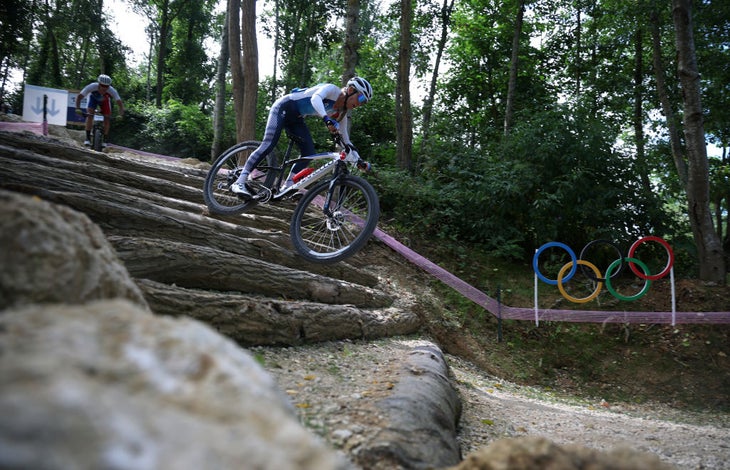
Her 2016 Olympics were torpedoed due to lingering complications from a broken leg. Afterwards, news circulated that she might quit cycling altogether. Then, just prior to the 2021 Summer Games in Tokyo, she underwent two surgeries to address a recurrence of iliac artery endofribrosis—a painful yet common cycling disorder in which blood flow to the legs is reduced by a thickening of the arteries. PFP wasn’t 100 percent recovered for the Tokyo Games, and again suffered disappointment.
Despite the setbacks, PFP kept racing and winning. She focused her attention primarily on mountain biking, and won the world championships in 2019, 2020, 2022, and 2023. The sum of her five elite titles are now the most in women’s mountain biking history.
Her big Olympic moment came in 2024, when Paris hosted the Summer Games. PFP dominated the race to win gold medal in front of a home crowd. It was a result we knew she was capable of getting—but was hardly guaranteed to ever win.
3. She Made A Bold Proclamation
As the sweat was still drying from her Olympic victory in Paris, PFP made a bold proclamation: she would return to road cycling in 2025 and attempt to win the Tour de France Femmes within three seasons. The women’s Tour de France, launched in 2022, was not around when PFP was racing full-time on the road, and its debut in 2022 immediately made it the most important women’s cycling event on the planet.
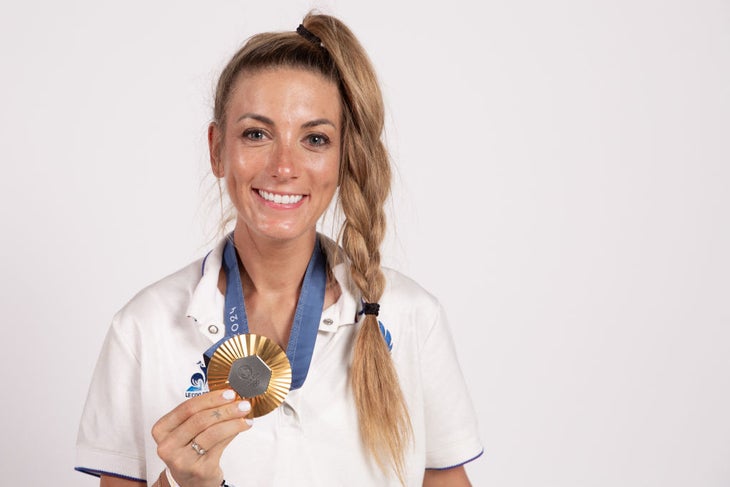
The proclamation was bold. A typical cross-country mountain bike race lasts an hour and a half. Tour de France Femmes stages are anywhere from three to five hours in length, and there are nine of them in successive days. And while mountain bike races are individual tests of skill and strength, road cycling is a team event with chess-like strategy.
4. She’s a Cobblestone Crusher
PFP looked strong but somewhat shaky in her return to road racing earlier this year. During Italy’s Milano-Sanremo race in March, she was penalized by umpires in the final sprint—she was fourth—after they concluded that she zigzagged across the road.
But her skills returned quickly once the peloton hit the cobblestones of Belgium and Northern France. At races like the Tour of Flanders and Paris-Roubaix, cyclists must ride their stiff road bikes over bone-rattling and slippery cobbles—a surface that only the best bike handlers can navigate. PFP was second at the Tour of Flanders before winning Paris-Roubaix.
Her big Roubaix win—the first of the season—was a sign that PFP road racing skills and strategic acumen were back to 100 percent.
5. She Broke France’s Losing Streak
PFP won the Tour de France Femmes on the long and grinding Alpine climbs. She survived the chaos and crashes in the race’s opening half, and then dropped the other top women on the Col du Madeleine and the ascent of Les Portes du Soleil to take the yellow jersey.
There’s a historic significance with PFP’s Tour de France win: it ended a 36-year losing streak at the world’s biggest road bike race.
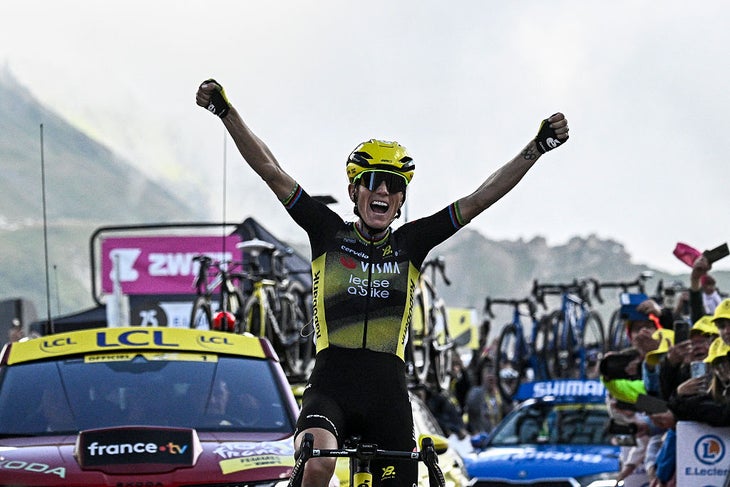
OK—if you want to be specific, there’s nuance in this figure, of course. The men’s Tour de France has operated since 1903, taking only a few years off here and there for world wars. The women’s Tour de France has been held, canceled, re-launched, canceled, and then re-launched again multiple times.
The last French winner was Jeannie Longo in 1989, and she won a race called Tour de France Feminin.
The last men’s winner was Bernard Hinault way back in 1985. Unfortunately for the French, there’s no male equivalent of PFP on the horizon.
That losing streak is likely to continue for many years to come.


